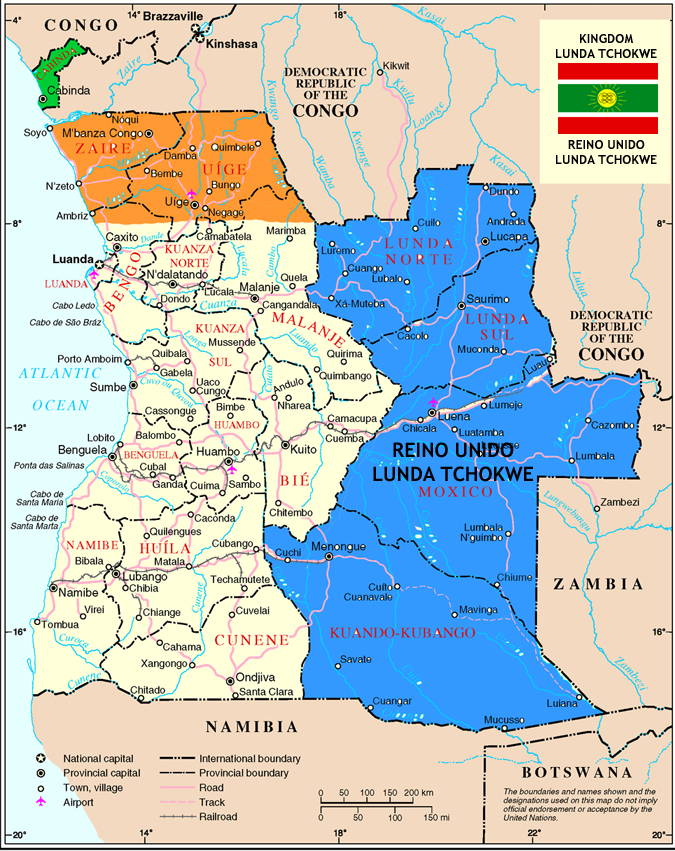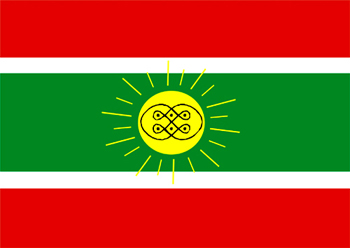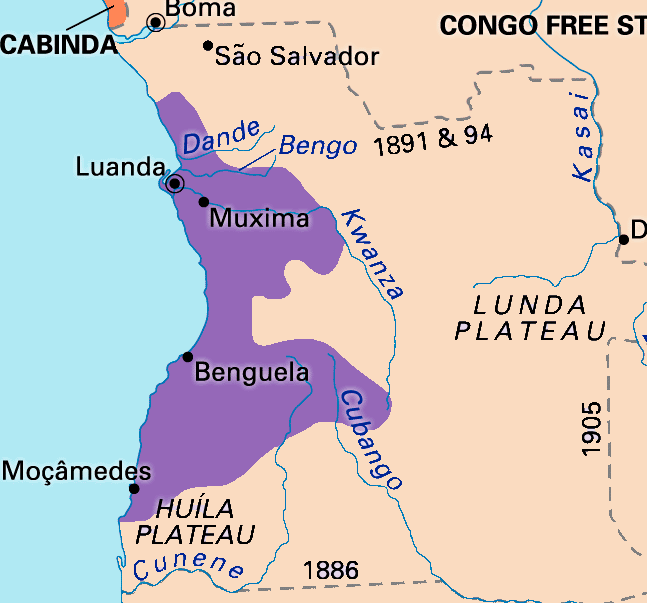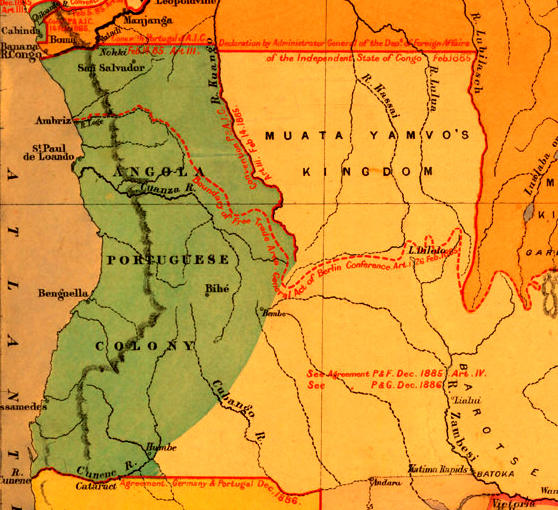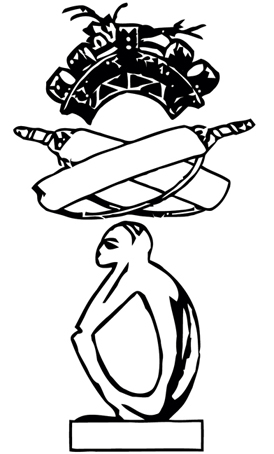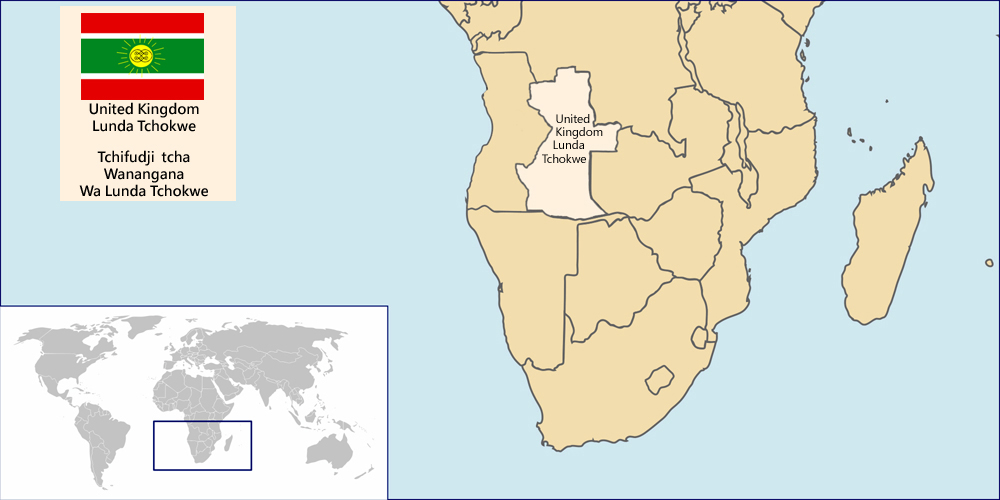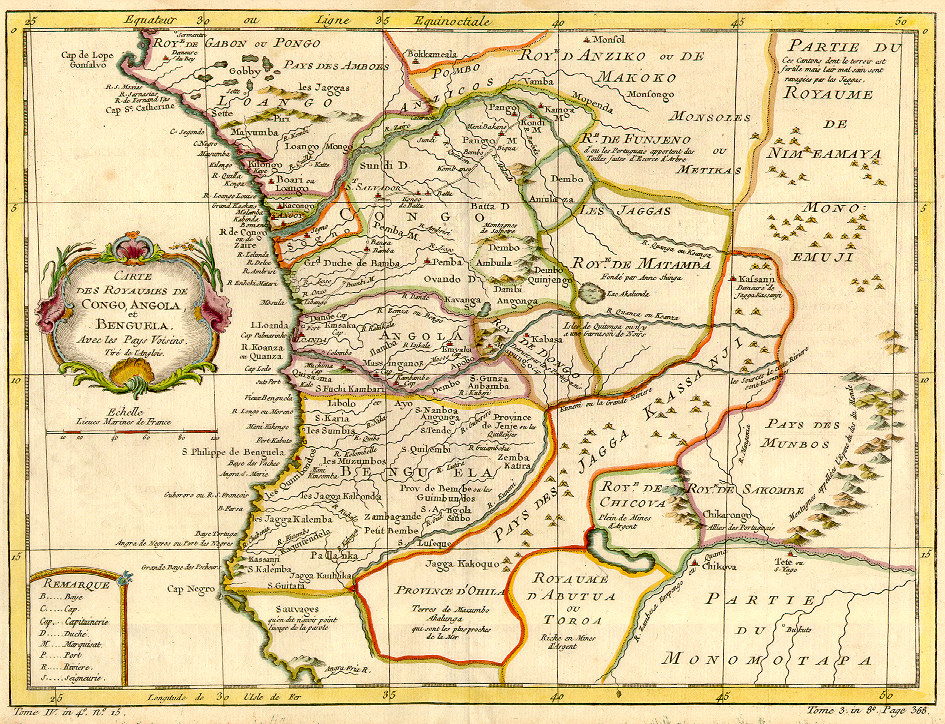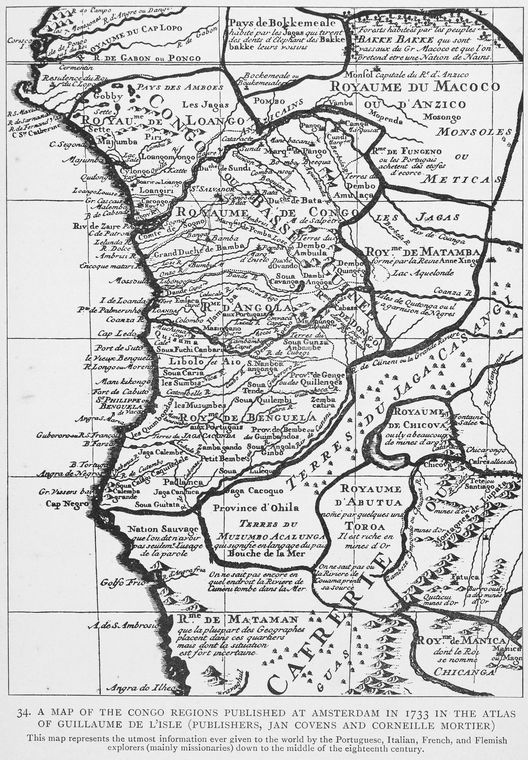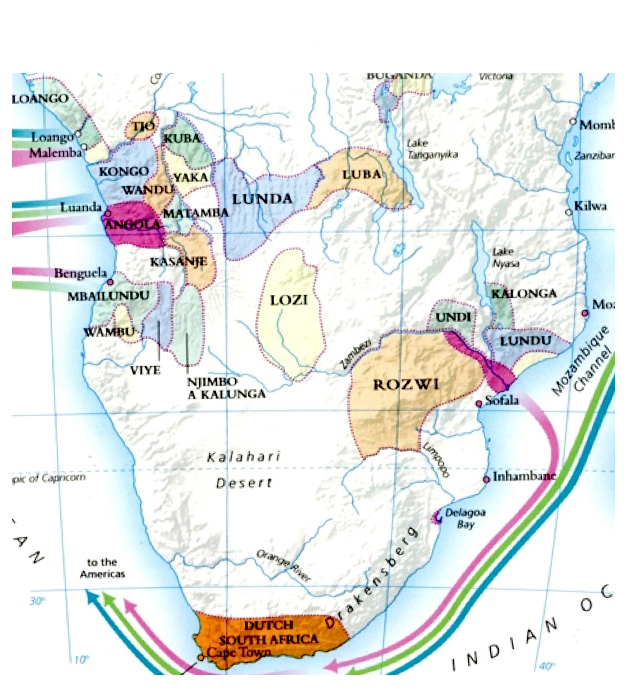In 1885 the Berlin Conference
decided that African territories should belong to those European nations
that establish “effective occupation,” and they rejected Portugal’s claim to
control the mouth of the Congo River. Major Henrique de Carvalho was sent to
the Lunda, and he made treaties with Chiefs and the Lunda King.
Treaties & Conventions
Signed between the portuguese and the
Lunda Tchokwe Kingdoms
1885, 23
February
- Protectorate Treaty signed between Portugal e Mona Samba (Capenda)
1885, 31 of October
- Protectorate Treaty signed between Portugal and Caungula (Xá Muteba)
1886, 2 of September
- Protectorate Treaty signed between Portugal and Tchissengue and his Nobles
Muananganas (Quiocos)
1886, 1 December, Lucusse
- Protectorate Treaty signed between Portugal and Muatianvua Ambinji
Superior of the Calambas of Moxico
1887, 18 of January
- Protectorate Treaty signed between Portugal and the Imperial Royal Court
of King MUATIÂNVUA
1890 - Agreement between Portugal and the Independent Free State of Kongo
concerning the Lunda Territory
1891 - Treaty between the the Independent State of the Kongo and
portugal, for the delimitations of their respective Spheres of sovereignty
and influence in the Lunda Region. Signed in Lisbon on the 25 May 1891,
rectified in Brussels on the 24 March 1894 and exchanged between the two
nations on the 1 August 1894.
Between 1917
and 1920 the Portuguese finally occupied the Lunda region east of the Kwango
River. Diamonds had been found in 1912, and in 1920 the Diamang company took
power and gave the Portuguese Government 5% of the shares and was exempted
on taxes and duties on imported equipment. Diamang soon recruited 10,000
workers.
Treaty of Protectorate
Signed between Portugal and the Imperial Royal Court of King
Muatianvua Mucanza 1887
18 January 1887 in
the Court of Mussumba of King MUATIÂNVUA in the right shore of the Calanhi
between the rivers Calanhi and Cajidixi in the lat. South of Equator 8º 21’
long. East of Gren223º 11’ and the altitude of 1:009 metres, in great
session assembled the King Muatiânvua Mucanza with his Royal Court in Ambula
a ceremonial square in front of his residence, in the shadow of 3 great
monumental trees which symbolize the institution of the State of the Emperor
King Muatianvua it was received in this local companied by the official
emissaries of the Emperor King Muatianvua and of Lucuoquexe, the ambassador
or Portugal the Portuguese Army major Henrique Augusto Dias de Carvalho
which was followed by a portuguese interpreter António Bezerra, of me that I
have been served as of secretary, employed by the expedition of José
Faustino Samuel, and of António Rocha and his country men and companions of
the Colony of which he is the chief in Luambata for the last 8 years in
substitution of Lourenço Bezerra that he created 15 years ago and he removed
from everything to Malange where he died 2 years ago: by Chiota master of
ceremonies and the great Potentate Chief Muene Dinhinga: - we started then
the firing of weapons in symbol of happiness for the arrival of the
ambassador and after the exchange of greetings in the usual manner the
ambassador was sited in a chair at the right of the Emperor King Muatianvua
Mucanza that he was seated under the royal canopy in the golden gilded
chair, a gift that the portuguese expedition brought, and after a reverenced
silence it was read and singed the following:
Art. 1.º - The
Muatiânvua and his court and the heirs of the present potentate chiefs,
Muatas of Lucano declared: they will never recognise any other sovereignty
other than that of portugal under the protectorate of which long ago their
grand fathers placed all their territories by them governed and which
constitute the State of Luanda and that they await that they be now occupied
by the ambassador of his Majesty Fidelíssima.
Art. 2.º – It is
considerate by the side of the portuguese government the present Muatas,
Muenes and Monas, and all other Quilolos of High and Low Nobility, Chiefs of
States and of smaller villages, all other dignitaries and Cacuatas and all
their people has subjects of portugal, and the territories that they occupy
or may acquire as integral part of the portuguese territories.
Art. 3.º – Each
other shall be obliged to protect and allow the ways to the villages and to
allow the freedom of commerce and of legal industry to all portuguese
individuals or in possession of authorization or order granted by the
Governor General of the Angolan Province, and to consent, to aid and to
guarantee the establishment of missions, factories, of colonies, of military
fortifications, of authorities and to facilitate the passage of scouts and
portuguese travellers in your Territories.
Art. 4.º - The
Emperor King Muatiânvua and his Royal Court will not consent that in any
case and under no pretext the subject authorities of the Muatianvua , for as
far it may be their dominions from the capital of the Kingdom permit the
establishment in their lands of colonies, forces or agents not portuguese or
under any other flag that may not be that of portugal, without the previous
authorization of the delegates of the portuguese government in the Lunda,
and until this will not present themselves, of the Governor General of
Angola, nor can negotiate with foreigner or national any political
concession of territories or power.
Art. 5.º –
Compromises the Muatianvua and all the Potentate Chiefs Muastas and others
his subjects not to make nor consent other to make in their territories
human sacrifices, sell or exchange of people for articles of commerce or the
payment of demands or penalties with people.
Art. 6.º – All
subject authorities to the Muatianvua with his sanction, are obliged from
now on to allow the passage, to give security and assistance to all
merchants and other persons that in peace and orderly manner may have to
cross or travel in your territories and villages, they must not request from
them any taxes or levies to none who have been previously regulated and
giving to the portuguese authorities or to any who represents it the
nearest, without bad treatment, violence or ado, to person or persons
strange to their country or tribe that are suspected of having committed any
damage in their territories.
Art. 7.º – That
all the Subjects of the King Muatianvua shall keep peace with the subject
people and friends of portugal and with the portuguese, submitting the
dissensions and the litigations when they arise and may be detrimental to
the judgement of the portuguese authorities.
Art. 8.º –
Portugal by its delegates or representatives recognizes all the present
Chiefs and those in future will confirm all those who to them will succeed
or that may be elevated to that category in accordance with the usages and
costumes that may be confirmed by the King Muatianvua; and obliges to
maintain the integrity of all his territories under his PROTECORATE and will
respect and it will make it to be respected the usages and costumes while
they are not modified by others that may be instituted for the same effects
and more profitable to the land and its inhabitants.
Art. 9.º – When
any complain be made, all will assist the authorities in the task to achieve
it, be it against who it may with part or with all its war forces.
Art. 10.º –
Recognised has it is Ianvo, common for Xa Madiamba elected by the Royal
Court of King Muatianvua; the present Treaty before it is presented to the
government of his majesty fidelíssima it will be submitted to his
appreciation, and may he with Caungula and Muata Cumbana make yet any
alterations they may see fit to obtain the PROTECTION that they ask to
portugal, and can only have execution by the order of the government of his
majesty and after the establishment of its delegates in the Lands of Lunda.
Calanhi the
capital of the State of the King Muatianvua 18 of January 1887 by others has
the procurators and placing them a + at the side of their names;
+ Muatianvua Mucanza
+ Suana Mulopo Umbala,
+ Lucuoquexe Palanga,
+ Muari Camina,
+ Suana Murunda,
+ Muene Dinhinga,
+ Canapumba Andunda,
+ Calala Catembo,
+ Muitia,
+ Muene Panda,
+ Cabatalata,
+ Paulo,
+ Adolpho,
+ Paulino of Loanda,
+ António Martins,
+ Domingos Simão of Ambaca,
and signed António
da Rocha, José Rodrigues da Cruz, António Bezerra of Lisboa, Agostinho
Alexandre Bezerra, João Pedro da Silva, Henrique Augusto Dias de Carvalho
the Chief of the Portuguese Expedition to the Court of the Muatianvua, and
at last me José Faustino Samuel who wrote it. It is in conformity and from
it, it has been made two copies one of which it was left to the King
Muatianvua, which was given to Camexi to present to Xa-Madiamba and the
original that will be sent to the government of his Majesty Fidelíssima.
José Faustino
Samuel,
Serving as Secretary
África Austral
Equatorial
As Fronteiras da Nação Lunda
Tchokwe foram defendias com o Tratado de 25 de Maio de 1891,
sucessivamente rectificado no dia 24 de Março de 1894, e confirmado com
as assinaturas no dia 1 Agosto de 1894
TCHIFUDJI
TCHA WANANGANA WA LUNDA TCHOKWE
The Royal Court of the
United Kingdom of
Lunda Tchokwe, in the Authority of His Sovereign Majesty
HRH the King Carlos Manuel
Muatchissengue Watembo
Government United Kingdom of Lunda Tchokwe
Governo do Reino Unido Lunda Tchokwe
Government departments and
their ministers:
Rt Hon Eng. José Mateus Zecamutchima,
Prime Minister, First Lord of the Treasury and Minister for the Civil
Service
Rt Hon Domingos Manuel Muatoyo,
Deputy Prime Minister
Rt Hon José da Silva,
Secretary of State
Rt Hon Júnior Betinho Cassoca,
Minister of State
HOME OFFICE
Rt Hon Dr. José Alberto Cupumbu,
Secretary for the Home Department
Rt Hon Paulina Jacinta Massolo, Minister for Women and Equalities
Rt Hon Bernardo N. Muacapenda, Minister of State for Immigration
DEPARTMENT FOR COMMUNITIES
AND LOCAL GOVERNMENT
Rt Hon Dr.º Kaita Tembo Chantal, Secretary of State for Native Communities
DEPARTMENT FOR CULTURE
MEDIA AND SPORT
Rt Hon Eng.º Cavula Muautende M., Secretary of State for Tourism and Culture
Rt Hon D. H. Samujaia,
Minister for Media, Parliamentary Under Secretary of State
Rt Hon Manuel José Ipanga, Minister for Youth and Sport
DEPARTMENT OF EDUCATION
Rt Hon Dr.º Jafredo Muamuchico Muecheno,
Secretary of State for Education
DEPARTMENT FOR TRADE AND
COMMERCE
Rt Hon Eng.º Manuel Tchivaco Yambissa,
Secretary of State of Industry and Mines
MINISTRY OF JUSTICE
Rt Hon Dr.º Carlos Filipe Mulopo,
Secretary of State for Justice
DEPARTMENT FOR ENVIRONMENT, FOOD AND RURAL AFFAIRS
Rt Hon Eng.º Cavanda J. Lunda,
Secretary of State for Agriculture
Rt Hon Domingos Mussulo Salomão, Minister for Agriculture
Rt Hon Andrada Futxieca, Minister for Rivers, Fisheries and
Aquaculture
DEPARTMENT FOR BUSINESS INNOVATION AND SKILLS
Rt Hon Eng.º Chikamba Chinhama,
Secretary of State for Science, Technology and Telecommunications
LUNDA TCHOKWE ROYAL
TREASURY
Rt Hon Drª Odeth da Conceição
Beatriz, Secretary of State of the Treasury
Rt Hon Impunga Samba Matxaxi,
Chief Secretary to the Treasury,
Minister of State for Economic Policy
FOREIGN OFFICE
Rt Hon Eng. Gideão dos Santos Muatchyavua, Secretary for Foreign Affairs
DEPARTMENT OF NATIONAL CONSTRUCTION AND PUBLIC WORKS
Rt Hon Dr.º
Bartolomeu Tchipamba Hilário, Secretary of State for National
Construction and Public Works
AMBASSADORS
EUROPEAN UNION
Rt Hon Osvaldo Ihanjika, Ambassador to the Seat of the European Union,
Brussels
Ambassador Extraordinary and Plenipotentiary Permanent
Representative of the United Kingdom of Lunda Tchokwe
UNITED STATES OF AMERICA
Rt Hon Michael Johnson, High Commissioner to the United States of America
UNITED KINGDOM
Rt Hon Impunga Samba Matxaxi,
High Commissioner to the United Kingdom
ICELAND
Rt Hon D. J. C.,
High Commissioner to Island
CANADA
Rt Hon Eng.º Cavanda J. Lunda,
High Commissioner to Canada
SOUTH AFRICA
Rt Hon Eng.º Chikamba Chinhama,
High Commissioner to South Africa
E-mail:
[email protected]
Actions
of Governments in Exile
International law recognizes that
Governments in Exile may undertake many types of actions in the conduct
of their daily affairs.
These actions include:
- Becoming a party to a bilateral or
international treaty.
- Amending or revising its own constitution.
- Maintaining military forces.
- Retaining (or "newly obtaining") diplomatic recognition by sovereign
states.
- Issuing identity cards.
- Allowing the formation of new political parties.
- Instituting democratic reforms holding elections allowing for direct
(or more broadly-based).
- Elections of its government officers, etc.
International Laws on
Self-Determination
The right to self-determination — which
allows people to secede from a mother state if they so choose — appears in
various international conventions, including the founding document of the
United Nations.
International Law
Dealing with Self-determination and Territorial Integrity
U.N. Founding Charter (Article 1) — 1945
• One purpose of the United Nations is “to develop friendly relations among
nations based on respect for the principle of
equal rights and self-determination of peoples, and to take other
appropriate measures to strengthen universal peace.”
U.N. Resolution 2625 — 1970
• “Every State has the duty to refrain from any forcible action which
deprives peoples referred to in the elaboration of
the principle of equal rights and self-determination of their right to
self-determination and freedom and independence.”
• “Nothing in the foregoing paragraphs shall be construed as authorizing or
encouraging any action which would dismember,
or impair, totally or in part, the territorial integrity or political unity
of sovereign and independent states conducting
themselves in compliance with the principle of equal rights and
self-determination of peoples and thus possessed of a
government representing the whole people belonging to the territory without
distinction to race, creed or colour.”
African Charter on Human and Peoples’ Rights (Article 20) —
1981
• “All peoples shall have . . . the unquestionable and inalienable right to
self-determination. They shall freely determine
their political status and shall pursue their economic development according
to the policy they have freely chosen.”
Conference on Security and Co-operation in Europe’s Charter
of Paris for a New Europe — 1990
• “We affirm that the ethnic, cultural, linguistic and religious identity of
national minorities will be protected.”
• “We reaffirm the equal rights of peoples and their right to
self-determination in conformity with the Charter of the
United Nations and with the relevant norms of international law, including
those related to territorial integrity of states.”
Vienna Declaration and Program of Action adopted by World
Conference of Human Rights — 1993
• The conference recognizes “the right of peoples to take any legitimate
action, in accordance with the Charter of the
U.N., to realize their inalienable right of self-determination.”
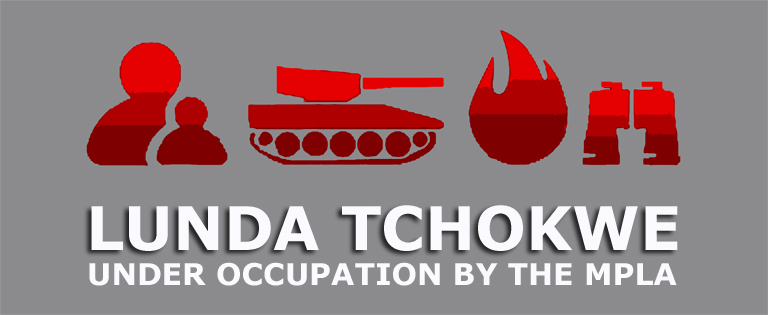
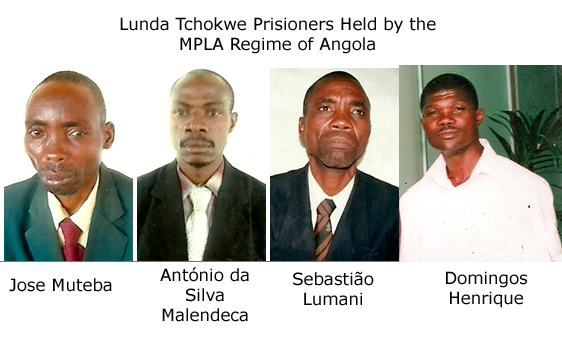
Lunda Tchokwe Political Prisoners
January 2012
Five political
prisoners and two detainees held at Kakanda prison in Lunda Norte, Angola,
are suffering from deteriorating health after finishing a 13-day-long hunger
strike in protest against their continued detention. The conditions in which
they are held have not improved, and they continue to be denied access to
medical treatment, clean water, and adequate food supplies.
The seven men: Sérgio Augusto; Sebastião Lumani; José Muteba; António
Malendeca; Domingos Henrique Samujaia, who were tried and convicted of
crimes against the state at different times in 2010 and 2011, and two
detainees, Mário Muamuene and Domingos Capenda, who were tried and acquitted
on 8 March yet remain in prison, went on hunger strike from 16 to 29 May
2011. Their health has since continued to worsen owing to the persisting
lack of sanitation, inadequate water provision and insufficient food supply-
a cupful of rice once a day.
These conditions place prisoners’ lives at risk and amount to cruel,
inhumane and degrading treatment.
Amnesty International is particularly concerned about Sebastião Lumani, José
Muteba, António Malendeka and Augusto Sérgio, who are reportedly the weakest
in the group and are suffering from other ailments. In addition, Sebastião
Lumani and José Muteba have reportedly contracted typhoid and are too weak
to stand or walk without assistance.
The men named
above were part of a group of some 40 members of the Comissão do Manifesto
Jurídico Sociológico do Protectorado da Lunda Tchokwe (Commission of the
Legal Sociological Manifesto of Lunda Tchokwe Protectorate- CMJSP-Lunda) and
were arrested at various times from April 2009 to October 2010. They were
initially held at Conduege prison in Lunda Norte Province.
On 7 February 2011
they were transferred to the newer Kakanda prison in Dundo, where conditions
were initially better. However, the prison has become overcrowded; there is
NO electricity; food and drinking water provision is scarce and there are no
health facilities there.
On 17 March 2011, over 30 of the CMJSP-Lunda detainees were released
following a petition of habeas corpus lodged by their lawyer. However the
five convicted prisoners and the two detainees mentioned above were not
among them.
Sérgio Augusto; Sebastião Lumani; José Muteba; António Malendeca; Domingos
Henrique Samujaia, were tried and convicted of crimes against the state at
different times in 2010 and 2011 and sentenced to prison terms ranging
between three and six years.
AMNESTY INTERNATIONAL pdf
MENSAGEM PARA OS ASSIMILADOS
AQUELES QUE DIZEM QUE SÃO ANGOLANOS
Quem é você? Você não sabe.
Não me diga que é um Angolano, não é isso.
O que você era antes que o colono Europeu batizou você de Angolano?
Onde você estava? E o que era teu?
Que língua você fala, então?
Qual era o seu nome?
Não poderia ter sido Vieira, Santos nem Dias .... ou Domingos.
Aquele não era o teu nome. Nós não temos esses tipos de nomes de
onde eu e você viemos.
Agora, qual era seu nome? E por que você já não sabe o que seu nome
era, então. Onde foi? Quando perdestes a tua Cultura? Que língua
você falava?
Onde está a tua história? Como é que um homem pode acabar com a sua
história? Que fez o homem, e o que fez o homem para fazer-te em um
idiota?
Regime Comunista e Corrupto do JES-MPLA coloca
membros do
Manifesto do Protectorado da Lunda Tchokwe a 3
anos de prisão
10 March 2011
No dia 8 de
Outubro de 2010, haviam sido raptados os membros do Manifesto do
Protectorado da Lunda Tchokwe em casa por volta das 19 horas, na cidade de
Dundo, Lunda-Norte, sem mandado, a luz do revogado artigo 26 da Lei 7/78 -
Crimes contra a segurança do Estado, trata-se dos Senhores Domingos Henrique
tc Samujaia, Domingos Capenda e Paulo Muamuene.
Neste mesmo mês e
ano 2010 constituiu-se um grupo de Advogados da Associação Mãos Livres, que
no pretérito mês de Janeiro de 2011, interpuseram um Habeas Corpus ao
Tribunal Supremo, porque a Lei 7/78 foi revogado e porque a prisão excedeu o
tempo que a lei estipula.
O Tribunal Supremo
até hoje não respondeu ao Habeas Corpus. No terreno os Tribunais e a Policia
continua a perseguir com prisões arbitrarias e a prender os membros do
Manifesto, um movimento reivindicativo pacifico, sem violência e que pauta
pelo dialogo como forma de resolução de qualquer tipo de conflito.
Hoje dia 10 de
Março de 2011, fomos surpreendidos, por volta das 14 horas que os nossos
membros na prisão da Kakanda, no Dundo haviam sido levados ao tribunal
Provincial para responderem pelo processo N.º 4381-B/2010 ( 3 membros), com
um advogado oficioso o Sr Dr Tchizeka, no lugar dos Advogados de defesa.
De acordo com as
informações que acabamos de receber, foi condenado a 3 anos de prisão
efectiva o Activista Domingos Henrique, pelo artigo 21 da Lei 23 do CP
Angola, que de acordo com a mesma fonte é Crime de Rebelião e Perturbação da
Ordem Publica. No lugar de Crimes contra a segurança do Estado que
inicialmente haviam sido indiciados em 2010.
Os outros dois
membros do mesmo processo foram colocados em Liberdade, trata-se dos
Activistas Domingos Capenda e Paulo Muamuene.
Desde 2007 até a
data já foram condenados 5 membros do Manifesto do Protectorado da Lunda
Tchokwe, com sentenças que vão desde os 3 à 6 anos de prisão efectiva, todos
pelo tribunal da Lunda-Norte. Em Luanda, foram colocados em Liberdade
condicional dois membros e o Dr.º Jota Filipe Malakito continua na Comarca
de Viana no Processo N.º 3450 - A/2009 Crimes contra a segurança de Estado.
Dr Jota Filipe
Malakito, Continua doente com problemas de perca continuada de visão,
problemas dos testículos e no Joelho. Tanto os já condenados e os outros
membros por julgarem cerca de 39 continuam no Kakanda.
7 de Fevereiro de 2011 a Policia do Lukapa havia
detido
Cidadão António Txichicussula por tirar Fotocopia em
documento com Informações De Jota Malakito
O cidadão em causa,
é activista do Movimento do Manifesto do Protectorado da Lunda Tchokwe,
continua há mais de um mês detido na cadeia da Policia do Comando Municipal
de Lukapa, LUNDA-NORTE.
Continua numa sala
em condições péssimas de vida, falta de alimentação e a proibição de receber
visitas. Não tem processo instaurado. Ninguém explica as razões do porque o
mesmo continua detido.
Informações que a
CMJSPLT teve acesso, indicam que a prisão do António Txichicussula é ilegal,
a secção da PGR municipal não legalizou a mesma. Solicitamos que o Cidadão
em causa seja posto em liberdade.
A seguir é o teor
da informação que havíamos noticiado no dia 10/02/2011.
Bodies of Female Victims repeatedly
appearing in the Lunda Tchokwe
25 February 2011
Zinha Maxingo also known as
Gizela a Lunda Tchokwe women of 24 years old, born on the 10 of November
1988 in the Municipality of Dala in Lunda-Sul, mother of 3 sons was found
murdered and the body thrown in the River Kapulumba next to the local
airport.
This is the second victim that appears in the same place and murdered in the
same manner: sexual violation, removal of belongings and thrown to the
river.
In 2010 it was found several bodies in the diamond mining areas, but more
precisely in the areas under the direct control of the Mining Private
Security Firms. All mines are in partnership with the MPLA Regime Ruling
Elite and the Private Security Companies all without exception are privately
owned by members of the MPLA Regime.
The young victim Zinha Maxingo also known as Gizela, was reported to be with
two sick sons, in the lack of jobs and abject poverty that rules and infests
the nation under the corrupt and clandestine MPLA Regime the victim decided
to go to her farm to harvest bombo to sell, this happened on the 23 February
2011, she left her house and did not return. The neighbours decided to
search for her, they found her drawn on the same evening at 19:00 hours and
her body was buried on the 24 February 2011.
Intimidation by the MPLA Regime of
the
Ethnic Population and Civilians of Lunda Tchokwe
7 February 2011
On the 7 of
February 2011, around 13:00 was kidnapped the civilian Mr. António
Txichicussula, a Human Rights Activist in the Sector of Calonda. Mr. António
Txichicussula was detained by the MPLA Regime when he was photocopying some
papers containing Dr. Dr Jota Filipe Malakito Photo.
He was apreended
in the shop SANKIF which the manager of the Shop is Mr. Celestino Zeula.
This are the details of the MPLA regime Agent that apreended the Lunda
Tchokwe Human Rights Activist.
MPLA regime Agent
Name: Mr. João Dumbo Son of: Mr. João Bernardo and of Mrs Emília Cipriana
natural of Benguela born on the 5 of November 1971 and resident in Lucapa.
Today 12 February
2011 we received information by phone from Lukapa that Mr. Celestino Zeula
remains detained by the MPLA Regime Police and denied any outside contact,
the MPLA Regime Police is not allowing him to receive any food, and he has
not eaten in the last 4 days. The cell where he is being unlawfully detained
the MPLA Regime is a room where there are 10 more persons in the same prison
cell, without any ventilation nor WC, and no water.
The People of Lunda and
Moxico march naked over diamonds
Where is the
revenue of the Diamonds of the producing regions? “In the ties” reply the
population of the Lunda Tchokwe. Near to the 4th largest deposit of Diamonds
in the World in the city of Saurimo, the capital of Lunda South.
This are the areas
less developed in contrast to the wealth of the Diamonds. There are no
health centres in the Lunda Tchokwe region. There are no running water,
electricity, roads, and houses. Both health and school infrastructures are
non existent. The people of Lunda Tchokwe lived better during the civil war
than now!
“The MPLA Regime
shows their ties, and say the society is developing”. The MPLA Regime farce
continues On the 4th of February 2011 the Deputy minister checked the
readiness of the MPLA Regime Police Forces in Lunda Norte.
Dundo – The deputy
minister of the Interior, Angelo Veiga Tavares, in since Thursday in Dundo
City, north-eastern Lunda North, to assess the readiness level of police
forces in this region. This Friday, Angelo Veiga Tavares will inaugurate the
Cacanda prison, which is located seven kilometres away from Dundo City.
Hunger Strike in the MPLA Regime Prison
of Kakanda Lunda North
14 February 2011
Lunda North a
Place where there is No Hospitals, No Schools, No Factories, No Investment,
but plenty of Prisons
More than 40 Lunda Tchokwe Human Rights Activists have been transferred to
the Conduege Prison to the new Prison of Kakanda in Lunda North, today the
14 of February 2011 they entered Hunger Strike, as a result of the
continuous violation by the MPLA Regime of their Liberty and basic Human
Rights the Hunger strike also aims to notify the International community of
the terrible injustices that the MPLA Regime continuous to perpetuate
against the Populations of Lunda, Kuando Kubango and Moxico.
MPLA Regime - Political detainees are held under
repealed law must be released
Amnesty International - 31 January 2011
Nearly 40 members
of the Commission of the Legal Sociological Manifesto of the Lunda Tchokwe
Protectorate (Comissão do Manifesto Jurídico Sociológico do Protectorado da
Lunda Tchokwe – CMJSP-Lunda), an organization that calls peacefully for
economic and administrative autonomy of the diamond rich Lunda provinces in
north-eastern Angola, were arrested between April 2009 and October 2010.
Most are being held in Conduege prison in Dundo, Lunda Norte province,
although three, including the organization’s leader were imprisoned in the
capital, Luanda. Most were charged with contravening the now repealed
Article 26 of Law on Crimes Against the Security of the State (Law 7/78 of
May 1978). The repealed article criminalised “All and every act, not
foreseen in the law that puts at risk or could put at risk the security of
the state”. This Article was vague and open to misuse by the Angolan
authorities who often used it to arrest peaceful political activists like
the CMJSP-Lunda Tchokwe members as well as human rights activists. The
article also violated international human rights law.
Soon after the law
was revoked in December 2010, four human rights activists who had been
convicted under the terms of this law were released from prison
unconditionally.
However, 33
members of the CMJSP-Lunda Tchokwe remain in detention without trial on
charges of contravening this article.
Three other
members of CMJSP-Lunda Tchokwe are serving prison sentences after been
convicted in September 2010 on the basis of Article 26.
The Angolan
authorities have not responded to the detainees’ lawyers appeal for their
release or to the writ of habeas corpus issued on 14 January 2011 They have
also not provided an explanation for their continued detention.
It is reported
that on 19 January the Supreme Court, which deals with habeas corpus
petitions, requested the Lunda Norte Provincial Court to explain why these
detainees had not been released. However, the Lunda Norte Provincial Court
has not yet responded to the request.
The continued
detention of the 36 members of the CMJSP-Lunda Tchokwe, charged under a law
that has now been repealed, is a violation of their human rights. Amnesty
International calls on the Angolan authorities to immediately and
unconditionally release these and all other detainees in the country being
held for allegedly violating this law, as well as those serving sentences
after being convicted on the basis of this law.
Presos políticos
em Angola detidos nos termos de uma lei inexistente
17 January 2011
Mais de 30 reclusos angolanos,
ainda detidos em condições deploráveis nos termos de
uma lei de segurança vaga e abolida o ano passado, devem ser libertados,
declararam os seus familiares à Amnistia Internacional.
Trinta e três membros de um grupo conhecido
como CMJSP-Lunda, que defenderam pacificamente a autonomia da região
da Lunda Tchokwe, estão ainda detidos na cadeia de Conduege, no norte
de Angola, apesar de a legislação de segurança generalista
ao abrigo da qual foram acusados ter sido revogada em Dezembro de 2010.
O agora revogado Artigo 26º da lei 7/78 criminalizava
“todo e qualquer acto, não previsto na lei, que ponha ou possa
pôr em perigo a segurança do estado” e prestava-se a
aplicação incorrecta pelas autoridades para prender activistas
políticos pacíficos e mesmo activistas dos direitos humanos
em alguns casos.
A esposa de um recluso, que falou à Amnistia
Internacional sob condição de anonimato, reclamou “A
lei já não existe. Então como é que [o meu marido]
ainda continua detido? Se a lei já não existe, deviam deixá-los
ir para casa.”
“Peço ao governo que os solte. O crime
deixou de ser crime.”
"Soubemos que outros foram libertados, então
porque é que ele tem que permanecer na prisão?"
"Devem soltá-los para que voltem para
as suas famílias... Deixaram-nos a sofrer sem os nossos maridos...
Os filhos precisam deles.”
As autoridades angolanas deixaram sem resposta os
apelos dos advogados no sentido de libertar os membros da CMJSP-Lunda desde
a revogação do Artigo 26º e não apresentaram também
qualquer razão para que continuem detidos.
Os activistas de direitos humanos condenados nos termos
desta lei noutras partes do país foram já libertados desde
a revogação da lei em Dezembro, mas a Amnistia Internacional
receia que os membros da CMJSP-Lunda estejam a ser alvos deliberados de
penas continuadas.
Os reclusos são originários de uma área
rica em diamantes nas províncias do leste de Angola. A Amnistia Internacional
recebeu relatos de abusos dos direitos humanos cometidos nesta região.
Durante o ano de 2010, um membro da CMJSP-Lunda que
se encontrava detido faleceu devido à falta de tratamento médico
na prisão e 37 membros do grupo quase morreram de fome e foram sujeitos
a condições terríveis durante a sua detenção
na cadeia de Conduege, na Lunda Norte.
“Saudamos a revogação do Artigo
26º, mas as autoridades angolanas devem agora libertar sem demora todos
os reclusos que foram originalmente detidos nos termos desta legislação
já extinta”, frisou Muluka-Anne Miti, investigadora da Amnistia
Internacional sobre questões relacionadas com Angola.
A CMJS-Lunda foi criada em 2007 para defender a autonomia
para o ex-reino Tchokwe, que abrange as actuais províncias da Lunda
Norte, Lunda Sul, Moxico e parte do Kuando Kubango.
Abaixo a Ocupacao do
MPLA
September 2010
O território do REINO
DA LUNDA TCHOKWE, é o mais atrasado, 90% da população
activa, menor de 35 anos de idade é analfabeta, os Guerrilheiros
que combateram ao lado do MPLA e da UNITA, foram entregue ao abandono, não
existe nenhuma instituição UNIVERSITARIA em toda a região,
dai a falta de quadros, não há emprego porque não existe
empresas, os Projectos Mineiros em nada beneficiam a região e não
empregam os nativos.
Inhumane conditions
under the unelected Communist Regime of the MPLA
September 2010
The territory of the Kingdom
Lunda Tchokwe, is the least developed, 90% of the workforce less than 35
years of age is illiterate, the guerrillas who fought alongside the MPLA
and UNITA, were delivered to abandonment, there is no university throughout
the region, hence the lack of professionals, there are no jobs because there
is no companies, mining projects don’t benefit the region and don’t
employ the locals.
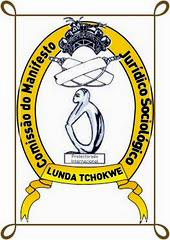
A Quesão da Lunda 1885-1894
/ 1975
“A Questão da Lunda 1885-1894/
1975” e o direito de Autonomia Administrativa e Financeira Efectiva,
nos termos de sucessão colectiva e fundamentos Jurídicos dos
tratados de Protectorado de 1885 – 1894, assinados entre Portugal
e Soberanos – Muananganas Lunda Tchokwe, da Convenção
de Lisboa de 25 de Maio de 1891, ractificado no dia 24 de Março de
1894 sobre a delimitação das fronteiras na Lunda e trocado
no dia 1 de Agosto do mesmo ano, entre Portugal e a Bélgica sob mediação
Internacional da França, na presença da Alemanha, Inglaterra
e do Vaticano, tornando assim a Lunda em um Estado Independente e os tratados
“Jus Cogens Internacional” – “Pacta Scripta Sunt
servanda”.
Portugal produziu moralmente a Lei N.º 8904/1955 de 19 de Fevereiro,
a Lunda foi atribuida a letra “g” no contexto das Nações,
assim como o nosso Manifesto dirigido ao regime nao eleito do MPLA no dia
3 de Agosto de 2007, a trocar a nossa própria independência
por mero Estatuto de Autonomia Administrativa e Financeira Efectiva, igual
a Madeira e Açores Ilhas de um mesmo país Portugal de forma
aberta, pública, Jurídica e transparente.

Visita da HH Princesa Mutumbo a Henrique Carvalho
Autores Morais do
Protectorado da LUNDA 1885/1894/1955 e 1975
“A Questão da Lunda 1885-1894/
1975” e o direito de Autonomia Administrativa e Financeira Efectiva,
nos termos de sucessão colectiva e fundamentos Jurídicos dos
tratados de Protectorado de 1885 – 1894, assinados entre Portugal
e Soberanos – Muananganas Lunda Tchokwe, da Convenção
de Lisboa de 25 de Maio de 1891, ractificado no dia 24 de Março de
1894 sobre a delimitação das fronteiras na Lunda e trocado
no dia 1 de Agosto do mesmo ano, entre Portugal e a Bélgica sob mediação
Internacional da França, na presença da Alemanha, Inglaterra
e do Vaticano, tornando assim a Lunda em um Estado Independente e os tratados
“Jus Cogens Internacional” – “Pacta Scripta Sunt
servanda”.
Portugal produziu moralmente a Lei N.º 8904/1955 de 19 de Fevereiro,
a Lunda foi atribuida a letra “g” no contexto das Nações,
assim como o nosso Manifesto dirigido ao Governo Angolano no dia 3 de Agosto
de 2007, a trocar a nossa própria independência por mero Estatuto
de Autonomia Administrativa e Financeira Efectiva, igual a Madeira e Açores
Ilhas de um mesmo país Portugal de forma aberta, pública,
Jurídica e transparente.
AUTORES MORAIS DO PROTECTORADO DA LUNDA:
1) PORTUGAL
2) BÉLGICA
3) FRANÇA
4) ALEMANHÃ
5) INGLATERRA
6) VATICANO
ACONTECIMENTOS
1885 - 1888 Tratados de Protectorados Portugal-Lundas
1885 - Convenção de 14 de Fevereiro
1890 – Conflito Portugal – Bélgica
1891 – Convenção de Lisboa Sobre a questão da
Lunda
1893 – Ractificação da acta das fronteiras na Lunda
1894 – Ractificação do Tratado das Fronteiras da Lunda
1894 – Troca das Assinaturas do Tratado das fronteiras Lunda
1895 – Primeiro Governo Independente da Lunda
1955 – Lei n.º 8904
1975 - Fim do Protecturado Exemplar do Governo de Portugal com Africa.
.
.
.
.
.
.
.
.
.
.
.
.
.
.
